#martin ginsburg
Explore tagged Tumblr posts
Text
Can anyone tell me if On The Basis of Sex is on Netflix? I want to watch it! (Again!)
0 notes
Text
An incomplete "there's a good chance the icon you love and support is a Zionist" list
🌟 Raphael Lemkin, a Jewish Holocaust survivor, whose family was murdered during it. Lemkin is responsible for coining the term "genocide," and for every legal provision that exists today against it. His work against genocide was inspired by his Zionism.
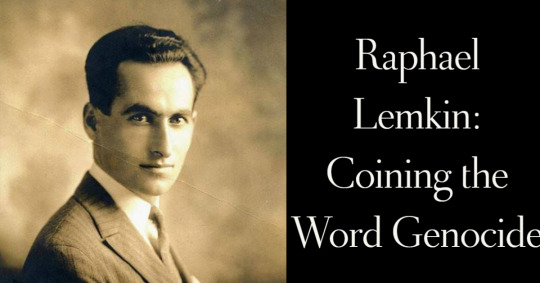
🌟 Martin Luther King, Jr., who did not only support Israel and its right to security, a fellow participant at a dinner with MLK shortly before his assassination quotes him as having stopped a student attacking Zionism, and replied, "When people criticize Zionists, they mean Jews. You’re talking antisemitism." He also encouraged Americans in 1967 to support the Jewish state, as Egypt blockaded the Straits of Tiran, endangering Israeli citizens by cutting the country off from its oil supply.
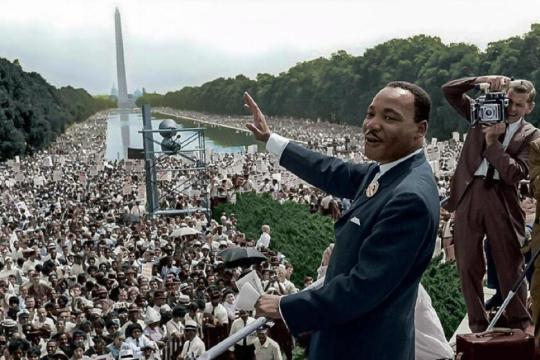
🌟 Emma Lazarus, a Jewish American poet, whose words ("Give me your tired, your poor, your huddled masses yearning to breath free") are engraved on the Statue of Liberty's pedestal, after they helped raise the money needed for its completion. Drawing from the value of Jewish solidarity, she also wrote, "Until we are all free, we are none of us free," adopted as a slogan by intersectionality (while many in the movement exclude Jews from it). She was a great supporter of establishing a state for Jews in the Jewish homeland, having argued for this idea years before the word "Zionist" was even coined.
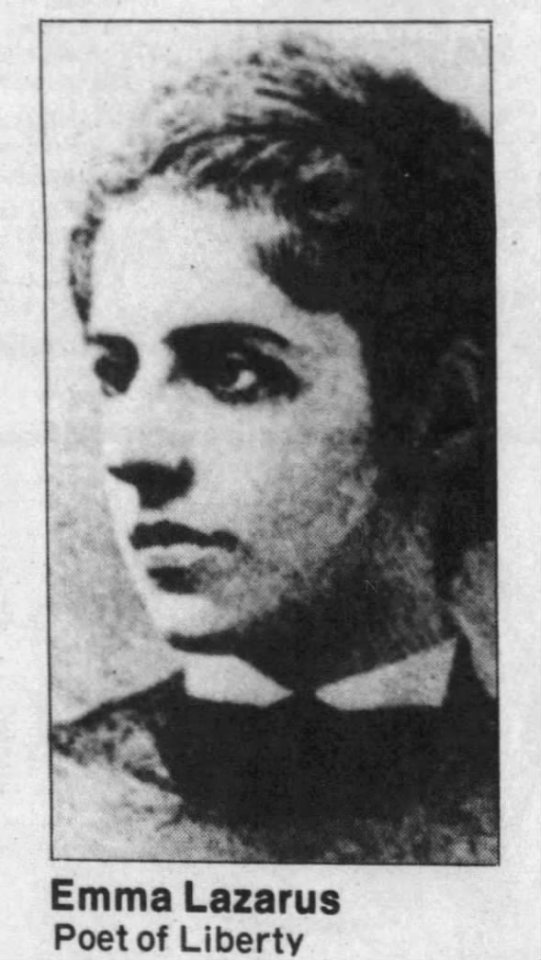
🌟 The 14th Dalai Lama, the leader of the fight against the occupation of Tibet, who was invited in 1994 to Israel, at a time when China's communist regime did its best to prevent his visits anywhere in the world, and who came to Israel more than once, talking about the 2000 years long Zionism of Jewish culture in exile as an inspiration and role model for Tibetans. "Among Tibetan refugees, we are always saying to ourselves that we must learn the Jewish secret to keep our traditions, in some cases under hostile circumstances."
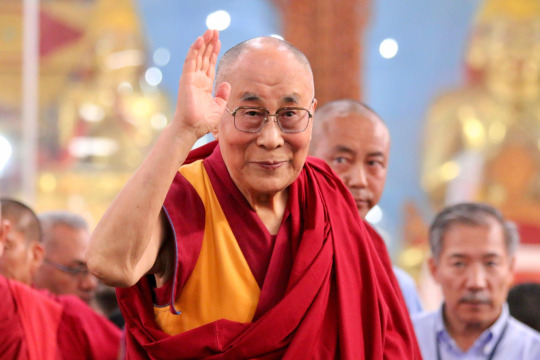
🌟 Ruth Bader Ginsburg, who spoke more than once about how her pursuit of justice is a continuation of that very same thing in Jewish tradition. She had repeatedly referred to American Zionist Jews as sources of inspiration. For example, in 2018, during her fifth visit to Israel, in a speech she gave when receiving the Genesis Award, she mentioned two such women, Emma Lazarus and Henrietta Szold.
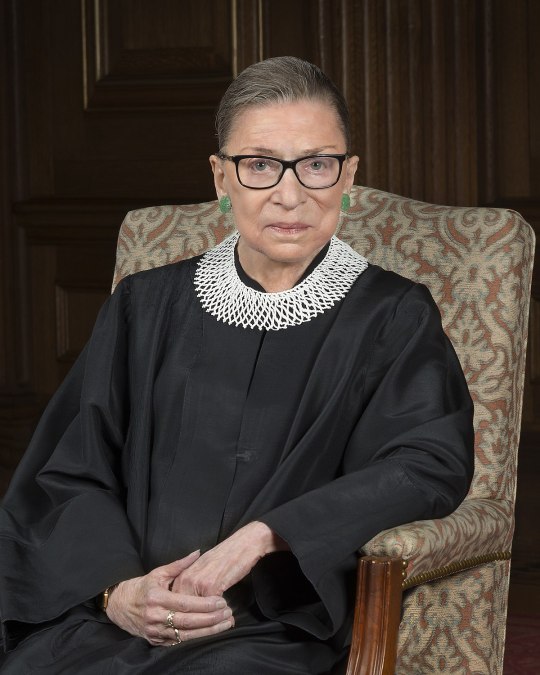
🌟 Nelson Mandela had an ambivalent view of Israel, but repeatedly recognized its right to exist, which makes him a Zionist, he also called upon Arab states to do the same, and was favorable towards the Zionist Jews who supported him during his underground days. Mandela being critical of Israel and still a Zionist is an apt reminder that criticizing the Jewish state and opposing its very existence are NOT the same thing, and only one's antisemitic.
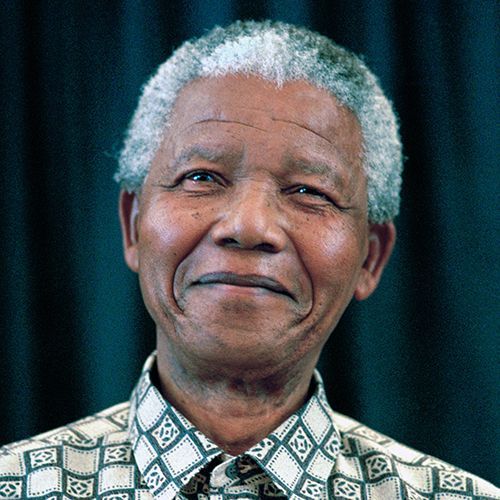
🌟 Felix Salten, the Jewish author of Bambi (the book Disney's movie is based on). The tale was originally a metaphor for Jews suffering antisemitism, something Salten personally had to cope with. He was also an ardent Zionist, feeling the self-liberation at the core of this ideology suited his idea of how to deal with Jew hatred.
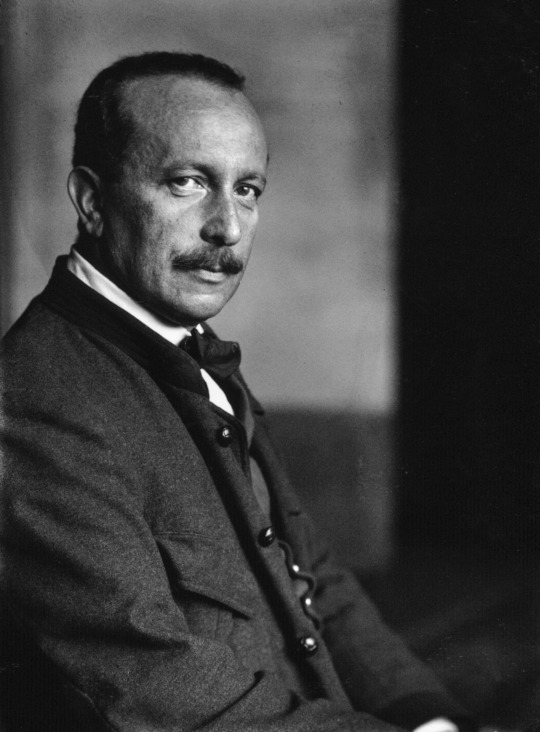
🌟 Sun Yat-Sen, who helped end the rule of China's last imperial dynasty, was its first provisional president, and is nowadays honored as an important Chinese leader in both China and Taiwan (sometimes referred to as "Father of the Chinese Nation"). He was an enthusiastic supporter of Zionism. Among other instances of expressing that, he wrote in a 1920 letter to a leader of the Jewish community in Shang Hai about Zionism that it is, "one of the greatest movements of the present time. All lovers of Democracy cannot help but support wholeheartedly and welcome with enthusiasm the movement to restore your wonderful and historic nation, which has contributed so much to the civilization of the world and which rightfully deserves an honorable place in the family of nations."
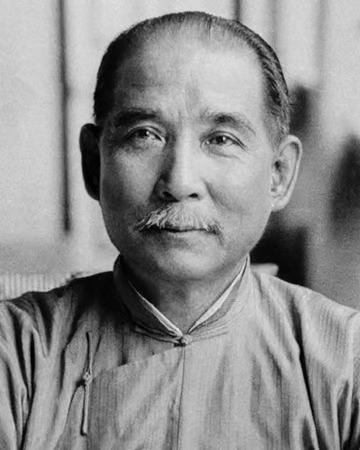
🌟 Magnus Hirschfeld, a gay Jewish sexologist, nicknamed among other things "The Einstein of Sex" and "The Father of Gay Liberation," because his medical and scientific work on human sexuality, as well as social advocacy for women's, gay and trans rights, was nothing short of pioneering. He was persecuted by the Nazis to the point where he died in exile. They broke into his institute of sexual research, where the world's first clinic performing sex reassignments surgeries was located, and burned down the institute's library. Hirschfeld had attended a Zionist conference following the Balfor Declaration of 1917, and his work on sexual liberation found inspiration in young socialist Jewish Zionist workers he met during a visit to the Land of Israel in 1931-2.
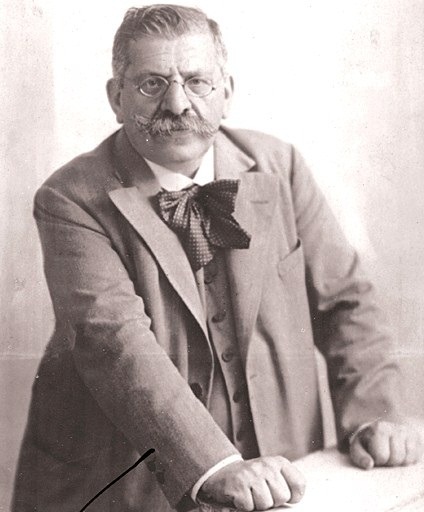
🌟 Marcia Langton, a professor and prominent Aboriginal rights activist from Australia, who has been leading the fight against racism and for her community. She spoke out against the hijacking of native rights movements by terrorist sympathizers and antisemites, and has clearly stood against all loss of life, including that of Israelis.

🌟 Felix Zandman, a Holocaust survivor whose work on resistors is integrated into many smartphones, laptops, cars, satellites, hospital ventilators (saving many Covid patients), airplanes and more. Whenever the anti-Israel crowd is scrolling social media on their phones, they're enjoying the work of a Zionist, who enthusiastically supported the State of Israel, and even introduced an important improvement to the Israeli Merkava tank, which has likely saved many Israeli lives, Jewish and non-Jewish alike, and others like him, since Israel's high tech is considered only second to Silicon Valley (going back to at least the 1990's). If they truly wish to boycott everything that's been "contaminated" by Zionism, they should probably just boycott technology.
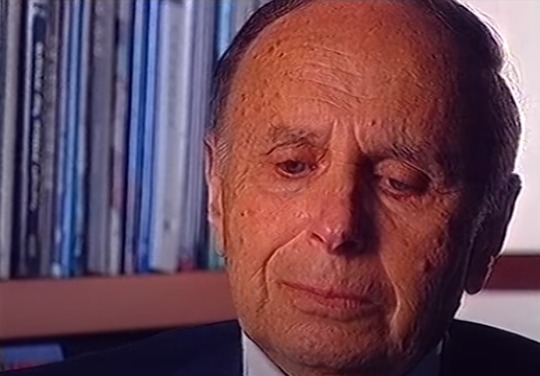
🌟 Rosa Parks, an African American leader of the civil rights movement (and someone who personally demonstrated how one can resist without turning violent). She was one of 200 notable black American leaders who publicly organized to express their support and respect of Zionism as the Jewish right to self-determination, and Israel as the manifestation of that right.
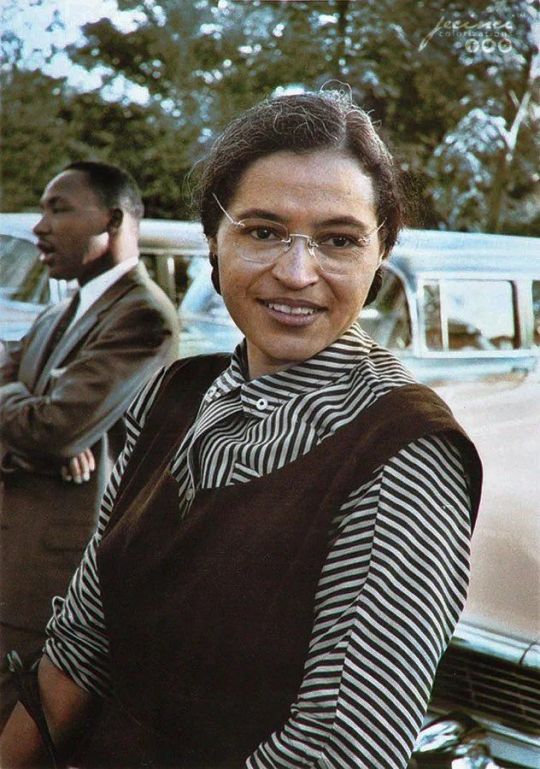
-> Like I said, this is VERY incomplete, even just in terms of how the overwhelming majority of Jews are Zionist, and have been since the inception of Judaism, which is itself Zionist. Over the years, this led to many non-Jewish human and native rights champions to be supportive of Zionism, too. Take note of who is being vilified, when the term "Zionist" is ignorantly used as if it means anything other than belief in the equal right of Jews to liberation and self-determination in the Jewish ancestral land. Especially when it is used as being inherently evil.
(for all of my updates and ask replies regarding Israel, click here)
#israel#israeli#israel news#israel under attack#israel under fire#israelunderattack#terrorism#anti terrorism#antisemitism#hamas#antisemitic#antisemites#jews#jew#judaism#jumblr#frumblr#jewish#resources
796 notes
·
View notes
Text
Here's your daily reminder that...
Jews are only 0.2% of the worlds population but...
Jews make up 14% of the World Total and 38% of the United States of America total winners for the Nobel Prize for Literature (source).
Of the 965 individual recipients of the Nobel Prize and the Nobel Memorial Prize in Economic Sciences between 1901 and 2023, at least 214 have been Jews or people with at least one Jewish parent, representing 22% of all recipients. (source)
Jews make up 14% of the total winners of the Pulitzer Prize for Fiction 18% of the total winners of the Pulitzer Prize for Poetry; 53% of the total winners of the Pulitzer Prize for Non-Fiction (source).
Jews make up 39% of the total winners of the Antoinette Perry (Tony) Award for Best Play; 54% of the total winners of the Tony Award for Best Book of a Musical (with 62% of all Composers and 66% of all Lyricists of Best Musical-winning productions being Jewish) (source).
Jews make up 40% of the total winners of the Academy Award (Oscar) for Best Original Screenplay; and 34% of the total winners of the Academy Award for Best Adapted Screenplay (source).
Although Jews constitute only 3% of the U.S. population...
80% of the nation’s professional comedians are Jewish (source).
90% of American comic book creators are jewish (source)
38% of the recipients of the United States National Medal of Science are Jewish (Source).
Jews are very successful, with educational levels higher than all other U.S. ethnic groups with the exception of Asian Americans, and income levels the highest of all groups. Six out of ten Jewish adults have college degrees, and 41% of Jewish families report a household income of $75,000 or more” (source)
Jews are a minority across the globe. We've been historically opressed and hated. But these key figures from history are all Jewish and loved, yet many don't even know they're jewish (or they don't know these people in the first place!):
Stan Lee (birth name: Stanley Martin Lieber) - An American comic book writer and editor, Former executive vice president and publisher of marvel Comics, creator of iron-man, spider-man, and more.
Albert Einstein - a Theoretical physicist, Received the 1921 Nobel Prize in Physics, developed the theory of relativity and the "worlds most famous equation" (E = mc^2), and more.
Ruth Bader Ginsburg - Former Associate Justice of the Supreme Court of the United States, co-authored the initial law school casebook on sex discrimination, co-founded the Women’s Rights Project at the ACLU in 1972, and more.
Jack Kirby (birth name: Jacob Kurtzberg) - an American comic book artist, co-creator of Captain America, one of the most influential comic book artists
Harry Houdini (birth name: Erich Weisz) - a Hungarian-American escape artist, illusionist, and stunt performer, noted for his escape acts.
Emma Lazarus - An American author remembered for her sonnet "The New Colossus," Inspired by The Statue of Liberty and inscribed on its pedestal as of 1903.
Julius Rosenthal, Lillian Wald, Rabbi Emil G. Hirsch, Stephen Wise, and Henry Moskowitz - Jewish activists that helped form the NAACP along with W.E.B. Dubois, Ida B. Wells-Barnett, and Mary Church Terrell.
Mark Zuckerberg - Founder and CEO of Meta, a businessman who co-founded the social media service Facebook, and within four years became the world’s youngest self-made billionaire Harvard alumni.
Joseph Pulitzer - a politician and newspaper publisher, his endowment to the Columbia University established the Pulitzer Prizes in 1917, he founded the Columbia School of Journalism which opened in 1912.
Jacob William Davis - a Latvian tailor who is credited with inventing modern jeans and who worked with Levi Strauss to patent and mass-produce them, died.
Irving Berlin - drafted at age 30 to write morale-boosting songs for military revues (including “God Bless America”). Many Berlin songs remained popular for decades, including “Puttin’ on the Ritz,” “Cheek to Cheek,” “Anything You Can Do (I Can Do Better),” “There’s No Business Like Show Business,” and two celebrating Christian holidays: “White Christmas” and “Easter Parade.”
Rabbi Abraham Joshua Heschel - received his doctorate in Berlin. He was arrested by the Nazis in 1938, moved to the U.S. in 1940, and became an influential figure in the 1960s, marching with the Rev. Martin Luther King Jr. in Selma, Alabama, and speaking out against the Vietnam War.
Elie Wiesel - Romanian-American writer and professor, holocaust survivor, nobel laureate, political activist. Authored 57 books including Night, a work based on his experiences as a Jewish prisoner in the Auschwitz and Buchenwald concentration camps
Bob Dylan - an icon of folk, rock and protest music, won the Nobel Prize in literature for his complex and poetic lyrics.
J. Robert Oppenheimer - ran the Manhattan Project, considered the "father of the atomic Bomb," presented with the Enrico Fermi Award by President Lyndon Johnson.
Betty Friedan - co-founded the National Organization of Women and became its first president, wrote The Feminine Mystique (1963) and helped spark the second wave of feminism.
Gloria Steinem - one of the most prominent feminists of all time, launched Ms. Magazine and co-founded the National Women’s Political Caucus with Bella Abzug, Shirley Chisholm, Betty Friedan and Myrlie Evers-Williams, widow of Medgar Evers.
Sergey Brin - an American businessman best known for co-founding Google with Larry Page, president of Alphabet Inc.
Judith Heumann - a founder of the disability rights movement, led a 26-day sit-in at a federal building in San Francisco. The protest spurred implementation of Section 504 of the Rehabilitation Act, a precursor to the Americans with Disabilities Act.
Larry Kramer - co-founded Gay Men’s Health Crisis in response to the AIDS epidemic but was soon ousted over his confrontational activism. He went on to help launch a more strident group, ACT UP, and wrote a critically acclaimed play, The Normal Heart, about the early AIDS years in New York City.
Steven Spielberg - released his critically acclaimed epic film Schindler’s List, based on the true story of a German industrialist who saved Jews during the Holocaust. The movie won seven Oscars and led Spielberg to launch the Shoah Foundation at the University of Southern California, which filmed interviews with 52,000 survivors of the Holocaust and genocides in Nanjing and Rwanda.
Calvin Klein - made designer jeans and the infamous ad starring Brooke Shields revolutionized the fashion industry, sold his company to Phillips-Van Heusen (now PVH) for $430 million. Klein was the first designer to win three consecutive Coty Awards for womenswear.
Daveed Diggs - an American actor, rapper, and singer-songwriter. he originated the dual roles of Marquis de Lafayette and Thomas Jefferson in the musical Hamilton, for which he won a 2016 Tony Award for Best Actor in a Featured Role in a Musical. Along with the main cast of Hamilton, he was awarded a Grammy Award for Best Musical Theater Album in the same year.
And so much more. (a pretty decent list is available here)
Not only that, but the following are all Jewish inventions...
The Teddy Bear - made by Morris and Rose Michtom in honor of Theodore "Teddy" Roosevelt.
The Ballpoint Pen - *the first commercially sucessfull ballpoint pen was made by Lazlo Biro, a Hungarian-Jew, and his brother.
Mobile Phones - made by Martin Cooper, nicknamed the "father of the cellphone", and was born in Chicago to Ukrainian Jewish immigrants.
The Barbie - made by Ruth Marianna Handler, born to Polish-Jewish immigrants.
Power Rangers - made by Haim Saban, a Jewish-Egyptian
Video Games - made by Ralph Baer, a German-Jew
Peeps - made by Sam Born, a Russian-Jewish immigrants who came to the United States in 1909.
Cards Against Humanity - created by a group of Jewish boys from the same high school
Many Superheroes including Superman, Ironman, spider-man, batman, and more!
and more! (an illustrated list available here.)
Conclusion: If you're Jewish, be proud. You come from a long line of successful people. No matter what happened to them, Jews persevered, and they strived for sucess. Be proud of your culture, your history, these are your people. You're Jewish.
(feel free to reblog and add more, or just comment and i'll add it!)
Last Updated: June 25, 1:35 AM EST
#funkowrites#jumblr#jewblr#jewish tumblr#israel solidarity#judaism#jewish#antisemitism#stop antisemitism#op is a proud jew#proud to be jewish#jewish joy#jewish positivity#jew#proud jew#we will persevere
563 notes
·
View notes
Text
EXCLUSIVE: Adele Lim is returning to work with Disney as director of the third installment of its prized Princess Diaries franchise.
It’s the second time Lim will be behind the camera after writing Disney’s animated 2021 movie, Raya and the Last Dragon. Lim made her directorial debut with the raunchy Lionsgate R-rated female Asian American comedy Joy Ride.
Debra Martin Chase is producing Princess Diaries 3. EPs include Lim’s producing partner Naia Cucukov and Melissa Stack.
Disney launched The Princess Diaries in 2001, catapulting Anne Hathaway into a marquee name at the box office. There was also a 2004 sequel, The Princess Diaries: Royal Engagement. Both also starred Julie Andrews and were directed by the late Garry Marshall. Together both pics grossed $300M WW. The first movie followed Hathaway’s Mia Thermopolis, who learns she’s the heir apparent to the throne of Genovia. She takes her friends Lilly and Michael Moscovitz along for the ride as she tries to navigate through teenagedom.
Lim tells us: “As a diehard fan of the original Princess Diaries, I’m beyond excited to be a part of bringing the third iteration of this beloved franchise to life. We look forward to celebrating its core tenants of female power, joy and mentorship with audiences worldwide.”
Lim’s credits include being a writer-producer on such TV shows as One Tree Hill and Lethal Weapon, as well as being the co-showrunner on the CW series Star-Crossed.
She wrote Warner Bros.’ blockbuster Jon Chu-directed rom-com Crazy Rich Asians, which grossed $174M stateside and picked up nominations for Best Picture at the Golden Globes and Producers Guild Awards and won the Critics Choice Award.
Last year Lim partnered with Naia Cucukov to form the production company 100 Tigers. Cucukov was a former Walden Media senior executive who’s credits include the Netflix series The Baby-Sitters Club and Manhunt. The mission for the company is to “foster and empower artists and projects that share our passion for female-forward, cross-cultural stories with global appeal and a glossy edge.” 100 Tigers has several projects in development at various studios including Amazon/MGM, HBO Max and ABC.
Lim is repped by Paradigm and Ginsburg, Daniels, Kallis. Chase is repped by CAA and Del Shaw Moonves Tanaka Finkelstein & Lezcano. Cucukov is repped by Paradigm and Sean Marks. Stack is represented by CAA and Kaplan/Perrone Entertainment.
19 notes
·
View notes
Text
The Inspiring Upbringing of Ruth Bader Ginsburg
by Sofia Bocchino
Most Americans know the name Ruth Bader Ginsburg, Former Associate Justice of the Supreme Court and feminist icon, but not many know how she became the influential judicial figure she will always be remembered as. Ginsburg served as an Associate Justice of the Supreme Court of the United States from 1993 to 2020, and was the second woman to serve as a Supreme Court justice in U.S. history. Growing up in Brooklyn during the 1930s and 40s, she experienced severe adversity from a young age. Her older sister died from meningitis at the age of six, and her mother died from cancer just days before her high school graduation, which she was unable to attend. Ginsburg also endured WWII in her childhood, which was an especially stressful time for her family because they were Jewish. Despite this adversity, Ginsburg excelled in school, and went on to study at Cornell University on a full scholarship. During her time there, she would meet many figures who influenced her future career, including her future husband, Martin Ginsburg, a nationally prominent tax attorney, Vladimir Nabokov, professor of literature and renowned Russian author who influenced her writing, and Robert Cushman, a constitutional lawyer who inspired her to practice law.
After graduating from Cornell, marrying Martin, having a daughter and spending two years in Oklahoma where her husband was stationed in the army, Ginsburg moved back to Massachusetts and began her legal studies at Harvard Law School. Ginsburg also became the first woman to ever serve on the editorial staff of the Harvard Law Review. However, in the midst of her studies, she had to move with her family to New York City after her husband took a job with a law firm, finishing her studies at Columbia Law School and graduating in 1959. After graduating, she struggled to find employment as a lawyer due to her gender and the fact that she was a mother. It was very rare for a woman to succeed in a law career during this time due to sexism and wage gaps. With the help of her professor from Columbia; however, Ginsburg was able to receive a clerkship under the Southern District of New York. There, she researched Swedish Civil Procedure, and her work was published in a book entitled Civil Procedure in Sweden (1965). Her experience as a clerk landed her the opportunity to work as an assistant professor at Rutgers School of Law; however, she was asked to accept a lower salary because of her husband’s well-paying job. In 1965, she gave birth to her second child. She was still working as an assistant professor and concealed her pregnancy for fear that her contract would not be renewed.
In 1970, after receiving tenure the year prior, Ginsburg became professionally involved in gender equality after being asked to moderate a student panel in “women’s liberation.” After only a year, Ginsburg published two law review articles, led a seminar in gender discrimination, and partnered with the American Civil Liberties Union (ACLU) to draft briefs in two federal cases. Throughout the 1970s, Ginsburg was a pioneer in the field of gender equality, drafting dozens of law review articles, contributing to Supreme Court briefs on gender discrimination, and co-authoring a law-school casebook on the matter. Due to her revolutionary research and career at Rutgers, Ginsburg became founding counsel of the ACLU’s Women’s Rights Project in 1972 and was hired by Columbia Law School, where she became the first tenured female faculty member. Throughout the 70s, Ginsburg argued before the Supreme Court six separate times and won five of the cases.
In 1980, President Jimmy Carter appointed Ruth Bader Ginsburg to the U.S. Court of Appeals for the District of Columbia Circuit in Washington, D.C. Ginsburg was a very liberal judge, and became heavily involved in protecting women’s reproductive rights, specifically the right to have an abortion. In 1993 she delivered the Madison Lecture at New York University Law School, providing a critique of the reasoning behind Roe v. Wade. Ginsburg argued that the court should have issued a more limited decision, providing room for the court to provide better details, claiming it would “reduce controversy rather than fuel it.”
In August of 1993, Ginsburg replaced Byron White on the Supreme Court after being nominated by president Bill Clinton and confirmed by the senate on a vote of 96-3. Ginsburg would continue to lead a fulfilling legacy for 27 years, some notable acts include requiring state funded schools to admit women (United States v. Virginia), creating strides towards equal pay in her dissent from the Supreme Court’s decision on the pay discrimination case (Ledbetter v. Goodyear Tire & Rubber Co.), protection of pregnant women in the workplace, a key vote in queer people’s right to same-sex marriage (Obergefell v. Hodges), and a pioneer in the protection of Roe v. Wade. Even after her death, Ruth Bader Ginsburg continues to pave the way for gender equality from her past work both inside and outside of the Supreme Court.
While women’s rights have been challenged in America, with the overturn of Roe v. Wade and the new President-elect’s decision to leave all aspects of reproductive rights up to each state, Ginsburg’s influence has been challenged. In spite of this injustice, feminists and pro-choice activists and politicians everywhere continue to advocate for reproductive rights. Now more than ever, it is crucial that politicians and activists across the country continue to advocate for reproductive rights and gender equality, as we are now entering a presidential term where those rights may be further threatened. This issue can be fought for through voting, educating yourself and others, and supporting political candidates and federal justices who will advocate for and work to re-establish reproductive rights and gender equality in law and government. Ruth Bader Ginsburg spent her whole life fighting for all encompassing women’s rights and gender equality, and as citizens who have been impacted by her work, it is expected that we carry on her legacy, especially in times of national adversity. Ruth Bader Ginsburg will be remembered in history as the first woman to make major breakthroughs in laws pertaining to women’s rights and gender equality as a tenured professor at Ivy League universities, all while raising two children. It was for those reasons and so much more that NYU law students and young people across the nation granted her the title of the “Notorious RBG.”
5 notes
·
View notes
Text

LETTERS FROM AN AMERICAN
March 31, 2024
HEATHER COX RICHARDSON
APR 01, 2024
On Wednesday, President Joe Biden issued an executive order instructing the National Park Service to “highlight important figures and chapters in women’s history.” “Women and girls of all backgrounds have shaped our country’s history, from the ongoing fight for justice and equality to cutting-edge scientific advancements and artistic achievements,” the announcement read. “Yet these contributions have often been overlooked. We must do more to recognize the role of women and girls in America’s story, including through the Federal Government’s recognition and interpretation of historic and cultural sites.”
In a time when American women are seeing their rights stripped away, it seems worthwhile on this last day of Women’s History Month to highlight the work of Supreme Court Justice Ruth Bader Ginsburg, who challenged the laws that barred women from jobs and denied them rights, eventually setting the country on a path to extend equal justice under law to women and LGBTQ Americans.
Ginsburg was born in Brooklyn, New York, on March 15, 1933, in an era when laws, as well as the customs they protected, treated women differently than men. Joan Ruth Bader, who went by her middle name, was the second daughter in a middle-class Jewish family. She went to public schools, where she excelled, and won a full scholarship to Cornell. There she met Martin Ginsburg, and they married after she graduated. “What made Marty so overwhelmingly attractive to me was that he cared that I had a brain,” she later explained. Relocating to Fort Sill, Oklahoma, for her husband’s army service, Ginsburg scored high on the civil service exam but could find work only as a typist. When she got pregnant with their daughter, Jane, she lost her job.
Two years later, the couple moved back east, where Marty had been admitted to Harvard Law School. Ginsburg was admitted the next year, one of 9 women in her class of more than 500 students; a dean asked her why she was “taking the place of a man.” She excelled, becoming the first woman on the prestigious Harvard Law Review. When her husband underwent surgery and radiation treatments for testicular cancer, she cared for him and their daughter while managing her studies and helping Marty with his. She rarely slept.
After he graduated, Martin Ginsburg got a job in New York, and Ginsburg transferred to Columbia Law School, where she graduated at the top of her class. But in 1959, law firms weren’t hiring women, and judges didn’t want them as clerks either—especially mothers, who might be distracted by their “familial obligations.” Finally, her mentor, law professor Gerald Gunther, got her a clerkship by threatening Judge Edmund Palmieri that if he did not take her, Gunther would never send him a clerk again.
After her clerkship and two years in Sweden, where laws about gender equality were far more advanced than in America, Ginsburg became one of America’s first female law professors. She worked first at Rutgers University—where she hid her pregnancy with her second child, James, until her contract was renewed—and then at Columbia Law School, where she was the first woman the school tenured.
At Rutgers she began her bid to level the legal playing field between men and women, extending equal protection under the law to include gender. Knowing she had to appeal to male judges, she often picked male plaintiffs to establish the principle of gender equality.
In 1971 she wrote the brief for Sally Reed in the case of Reed vs. Reed, when the Supreme Court decided that an Idaho law specifying that “males must be preferred to females” in appointing administrators of estates was unconstitutional. Chief Justice Warren Burger, who had been appointed by Richard Nixon, wrote: “To give a mandatory preference to members of either sex over members of the other…is to make the very kind of arbitrary legislative choice forbidden by the Equal Protection Clause of the Fourteenth Amendment” to the Constitution.
In 1972, Ginsburg won the case of Moritz v. Commissioner. She argued that a law preventing a bachelor, Charles Moritz, from claiming a tax deduction for the care of his aged mother because the deduction could be claimed only by women, or by widowed or divorced men, was discriminatory. The United States Court of Appeals for the Tenth Circuit agreed, citing Reed v. Reed when it decided that discrimination on the basis of sex violated the Equal Protection Clause of the Fourteenth Amendment to the Constitution.
In that same year, Ginsburg founded the Women’s Rights Project at the American Civil Liberties Union (ACLU). Between 1973 and 1976, she argued six gender discrimination cases before the Supreme Court. She won five. The first time she appeared before the court, she quoted nineteenth-century abolitionist and women’s rights activist Sarah Grimké: “I ask no favor for my sex. All I ask of our brethren is that they take their feet off our necks.”
Nominated to the Supreme Court by President Bill Clinton in 1993, she was confirmed by a vote of 96 to 3. Clinton called her “the Thurgood Marshall of gender-equality law.”
In her 27 years on the Supreme Court, Ginsburg championed equal rights both from the majority and in dissent (which she would mark by wearing a sequined collar), including her angry dissent in 2006 in Ledbetter v. Goodyear Tire & Rubber when the plaintiff, Lilly Ledbetter, was denied decades of missing wages because the statute of limitations had already passed when she discovered she had been paid far less than the men with whom she worked. “The court does not comprehend or is indifferent to the insidious way in which women can be victims of pay discrimination,” Ginsburg wrote. Congress went on to change the law, and the first bill President Barack Obama signed was the Lilly Ledbetter Fair Pay Act.
In 2013, Ginsburg famously dissented from the majority in Shelby County v. Holder, the case that gutted the 1965 Voting Rights Act. The majority decided to remove the provision of the law that required states with histories of voter suppression to get federal approval before changing election laws, arguing that such preclearance was no longer necessary. Ginsburg wrote: “Throwing out preclearance when it has worked and is continuing to work to stop discriminatory changes is like throwing away your umbrella in a rainstorm because you are not getting wet.” As she predicted, after the decision, many states immediately began to restrict voting.
Ginsburg’s dissent made her a cultural icon. Admirers called her “The Notorious R.B.G.” after the rapper The Notorious B.I.G., wore clothing with her image on it, dressed as her for Halloween, and bought RBG dolls and coloring books. In 2018 the hit documentary "RBG" told the story of her life, and as she aged, she became a fitness influencer for her relentless strength-training regimen. She was also known for her plain speaking. When asked when there would be enough women on the Supreme Court, for example, she answered: “[W]hen there are nine.”
Ginsburg’s death on September 18, 2020, brought widespread mourning among those who saw her as a champion for equal rights for women, LGBTQ Americans, minorities, and those who believe the role of the government is to make sure that all Americans enjoy equal justice under law. Upon her passing, former secretary of state Hillary Clinton tweeted: “Justice Ginsburg paved the way for so many women, including me. There will never be another like her. Thank you RBG.”
Just eight days after Ginsburg’s death, then-president Donald Trump nominated extremist Amy Coney Barrett to take her seat on the court, and then–Senate majority leader Mitch McConnell (R-KY) rushed her confirmation hearings so the Senate could confirm her before the 2020 presidential election. It did so on October 26, 2020. Barrett was a key vote on the June 2022 Dobbs v. Jackson Women’s Health Organization decision, the Supreme Court ruling that overturned the 1973 Roe v. Wade decision recognizing the constitutional right to abortion.
Ginsburg often quoted Justice Louis Brandeis’s famous line, “The greatest menace to freedom is an inert people,” and she advised people to “fight for the things you care about, but do it in a way that will lead others to join you.”
Setting an example for how to advance the principle of equality, she told the directors of the documentary RBG that she wanted to be remembered “[j]ust as someone who did whatever she could, with whatever limited talent she had, to move society along in the direction I would like it to be for my children and grandchildren.”
LETTERS FROM AN AMERICAN
HEATHER COX RICHARDSON
#Letters From An American#Heather Cox Richardson#history#women's history#women#Ruth Bader Ginsburg#women's rights#US History
10 notes
·
View notes
Text
instagram
Armie Hammer talking about the Martin Ginsburg cookbook, that he received personally from Ruth Bader-Ginsburg. 🥰💙
7 notes
·
View notes
Text
In his first, jointly written article for the Crimson, Buttigieg urged his fellow students to view not only community service but also political engagement as a valuable form of extracurricular activity. Buttigieg himself had worked briefly in a shelter for battered women during the summer after his freshman year. But as was happening elsewhere, a rift was opening at Harvard between students committed to such work, or to tutoring students or volunteering at homeless shelters, on the one hand, and those committed to political action on the other. In the Crimson article Buttigieg expressed alarm at how few young people were voting, working in campaigns, or participating in demonstrations. “In a nation where a lifetime of honorable work in direct service could be wiped out by a single stroke of poor policy from an elected official or legislature, the absence of our generation’s voice from the political process is a hazardous reality for anyone committed to social progress, and a red flag for democracy itself.”
That commitment brought Buttigieg to my classes in his senior year. The course he took in the fall semester, Social Thought in Modern America, was described by the Crimson as “the toughest humanities class at the College, combining soul-crushingly dense and difficult material with a will-breaking workload.” In other words, it was a class for people like Pete, Previn Warren, their friend and fellow IOP stalwart Ilan Graff, and fifty-two other smart, intellectually ambitious students keen to study the relation between ideas and politics in post–Civil War U.S. history. Because the course involved a great deal of class discussion, and student demand exceeded the number of names I could learn—and I believe teachers should know their students—I limited enrollment. Instead of choosing the class by lottery, as many professors do in such circumstances, I preferred to decide who should enroll.
To inform my judgments, I required interested students to write an essay explaining why the course was important to their studies at Harvard and, if possible, to their plans afterward. I also required interested students to meet with me, after I had read their essays, to discuss their reasons in greater detail. Because the course involved three discussions a week—twice a week for half of the ninety-minute lecture meetings, and once in the smaller discussion sections run by graduate students—I wanted to know which students were willing to stay on top of the readings, write the required three essays, and prepare for midterm and final examinations that involved identifying passages from the readings as well as writing synthetic essays.
Tempting as it is to contest the Crimson’s characterization, the course was, and has remained, demanding. The readings in 2003, which averaged 250 pages a week, included works of philosophy, social and political theory, religion, literature, and cultural criticism. Writers included the usual suspects for a course in American intellectual history: William James, John Dewey, and W.E.B. Du Bois; William Graham Sumner, Edward Bellamy, and Louis Brandeis; Chief Joseph, Helen Hunt Jackson, and Black Elk; Elizabeth Cady Stanton, Charlotte Perkins Gilman, and Jane Addams; Gertrude Stein, T. S. Eliot, and Walter Lippmann; Reinhold Niebuhr, John Courtney Murray, and Martin Luther King, Jr.; Ralph Ellison, Langston Hughes, and Malcolm X; Clement Greenberg, Allen Ginsburg, and Betty Friedan; Samuel Huntington, Daniel Bell, and Irving Kristol; Judith Butler, Robert Putnam, and Kwame Anthony Appiah; and others. Students wrote essays on topics such as the impact of science on post–Civil War culture; the role of ethnic diversity and racial differences in shaping twentieth-century American politics and ideas; varieties of American feminist thought; and the relation between pragmatist philosophy and democracy. In short, the course was not intended for those who, in the words of New York Times columnist Ross Douthat (himself a survivor of the course), were looking to “skate through” Harvard.
2 notes
·
View notes
Note
you've hread about Apple jeans and never gonna give you up, now get ready for.....
An open window A novel, a couple holding hands An avocado A poem written in the sand
Fresh fallen snow on the ground A golden retriever in a flower crown Is this heaven? Or is it just a
White woman A white woman's Instagram White woman A white woman's Instagram (Instagram) White woman (white woman) A white woman's Instagram White woman A white woman's Instagram
Latte foam art, tiny pumpkins Fuzzy, comfy socks Coffee table made out of driftwood A bobblehead of Ruth Bader Ginsburg A needlepoint of a fox
Some random quote from Lord of the Rings Incorrectly attributed to Martin Luther King Is this heaven? Or am I looking at a
White woman A white woman's Instagram White woman A white woman's Instagram (Instagram) White woman (white woman) A white woman's Instagram White woman A white woman's Instagram
Her favorite photo of her mom The caption says, "I can't believe it It's been a decade since you've been gone Mama, I miss you, I miss sitting with you in the front yard Still figuring out how to keep living without ya It's got a little better but it's still hard Mama, I got a job I love and my own apartment Mama, I got a boyfriend and I'm crazy about him Your little girl didn't do too bad Mama, I love you, give a hug and kiss to dad"
A goat cheese salad (goat cheese salad) A backlit hammock (backlit hammock) A simple glass of wine Incredibly derivative political street art A dreamcatcher bought from Urban Outfitters A vintage neon sign
Three little words, a couple of doves And a ring on her finger from the person that she loves Is this heaven? Or is it just a
White woman A white woman's Instagram White woman (white woman) A white woman's Instagram (Instagram) White woman (white woman) A white woman's Instagram White woman A white woman's Instagram
Not even surprised anymore😭
15 notes
·
View notes
Text

Em 2011, Beyoncé lançou uma canção que se tornou icónica, cujo refrão lança uma pergunta que há muito borbulha dentro de todos nós: “Who run the World?/Girls”. O mundo pode ainda não ser governado por mulheres, mas algumas delas, espalhadas pelos cinco continentes, estão em posição de o colocar no rumo certo. Escolhemos seis que nos fazem acreditar num amanhã mais justo, mais promissor e mais igualitário. E hoje apresentamos Ruth Bader Ginsburg.
Em finais do ano 2000, alguém disse que existiam três ícones pop no planeta: Cristiano Ronaldo, Beyoncé e Barack Obama. Esqueceu-se de acrescentar à lista Ruth Bader Ginsburg, juíza, magistrada do Supremo Tribunal dos Estados Unidos da América e veterana na defesa dos direitos das mulheres. Aos 87 anos, a advogada (começou por estudar na Universidade de Cornell, em Ithaca, Nova Iorque, onde obteve o bacharelato, e foi aí que conheceu o marido, Martin D. Ginsburg, e acabou por se matricular na prestigiada Faculdade de Direito de Harvard, em 1956, onde era uma das nove mulheres num curso com 500 homens) é uma das pessoas mais poderosas do seu país, tanto pelo seu trajeto exemplar como por sempre se ter mantido fiel aos seus princípios – e uma das mais acarinhadas, já que o seu nickname, Notorious RBG, um trocadilho com o nome do falecido rapper Notorious B.I.G., aparece estampado em canecas, t-shirts, pins, e demais souvenirs.
Em 2018, as cineastas Betsy West e Julie Cohen realizaram um documentário sobre a sua vida, apelidado, precisamente, RBG, que acabou por ganhar prémios como o BAFTA para Melhor Documentário. Mas de onde vem, afinal, este fascínio? Podíamos começar pelo esforço que Ginsburg fez para concluir o seu curso, mesmo após o reitor de Harvard supostamente perguntar às (poucas) alunas mulheres “Como justifica ocupar uma vaga que deveria pertencer a um homem qualificado?” Ou então puxar pela sua persistência, em prosseguir a sua educação e manter o seu casamento – além das aulas, tinha a seu cargo uma bebé de 14 meses, a sua primeira filha, e quando o marido foi contratado para um emprego na Big Apple, Ruth transferiu-se para a Faculdade de Direito de Columbia, onde finalmente se formou, em 1959.
No início da sua carreira, foi rejeitada várias vezes pelo seu género, apesar de possuir inúmeras recomendações de professores. Só que a fibra de RBG, filha de imigrantes judeus, nascida a 15 de março de 1933 em Brooklyn, não era, nunca foi, a dos desistentes. Foi ativista, professora associada, fundou projetos inovadores na luta pelos direitos das mulheres no seio da União Americana pelas Liberdades Civis (ACLU) e, como advogada, nunca se recusou a aceitar casos “perdidos” – os chamados casos “sem precedentes”, que não têm termo de comparação com outra ocorrência do passado e, de certa forma, diminuir as possibilidades de vitória – que pudessem significar um avanço na luta pela igualdade entre homens e mulheres.
Em 1993, o presidente Bill Clinton nomeou-a para o Supremo Tribunal dos EUA, onde se destacou, entre outras coisas, por ter sido o primeiro membro daquela organização a manifestar-se abertamente a favor da legalização do aborto. Maravilhosamente à frente do seu tempo, RBG, cuja imagem de marca é um pequeno rabo de cavalo na nuca, uns óculos de massa grossos, e grandes golas que sobressaem sobre a toga, e que apesar da saúde frágil se mantém no ativo, é uma feminista orgulhosa. Uma das frases que mais aprecia é da autoria da sufragista americana Sarah Grimké: “Não peço nenhum favor para o meu sexo. Tudo o que peço aos nossos irmãos é que retirem os pés dos nossos pescoços.”
© Ana Murcho / Vogue Portugal
Ruth Bader Ginsburg = Joan Ruth Bader Ginsburg, March 15, 1933, New York City, U.S. - September 18, 2020, Washington, D.C., U.S.
1 note
·
View note
Text
youtube
If She's Anything Like Me - MALINDA (lyric video) STREAM AND DOWNLOAD: https://bit.ly/3dbQq8H SUBSCRIBE and hit that bell: https://bit.ly/2OgWtuA SUPPORT my videos on Patreon: http://bit.ly/MKRsupport FOLLOW ME ON SPOTIFY: https://ift.tt/VEG1Y6i MERCH: https://shopmalinda.com Follow me on: Twitter @missmalindakat https://twitter.com/missmalindakat Facebook https://ift.tt/foIOciS Instagram @missmalindakat https://ift.tt/QEJr4dN TikTok @malindamusic https://ift.tt/FeHQErC For fan mail: 3430 Connecticut Ave NW PO Box 11855 Washington DC 20008 **EQUIPMENT** (all links are affiliate links, so if you buy from here you support me too!) AUDIO For singing: http://amzn.to/2wwYXRo For vlogging: http://amzn.to/2wyQfSE A great start mic: http://amzn.to/2xhkScb Interface: http://amzn.to/2fAxFyM VIDEO Camera: http://amzn.to/2hi08JS Lens: http://amzn.to/2fABZ14 Vlog camera: http://amzn.to/2xnN4vT I use Logic and Final Cut Pro to edit audio and video respectively :) THANK YOU PATRONS!! Christian Ashby Ed Banas Russ Billings Caleb Bukowsky Heather BookCat Bree Campbell Will & Sheila Cole Mariah Dierking Hank van deventer Samuel Duckworth Adrian Durand Fr. Joe Fessenden The Fishers Andy Fowler Mariah Fyock-Williams Robert Gibbons Jr Mimi Ginsburg Marlo Delfin Gonzales Reinier van Grieken Matthew Hasking Adam Hocken Pippa Hillebrand Brian Hughes Ines Jonathan Isip Dave Jones Rita K Joseph K Philip Steven Keroff Sam Knetsch Balazs Kis Raphael Lauterbach Mathieu Landry Scott Lawrence Kiara Maken Alex Molloy Geoffrey Morgan Eystein Nicolaysen Jonathan Neese Chris Plater Razillie Rachel-Maya RC Norbert Schmitz Martin Schorel Christoph Schreiner Jeff Schwarz Alexis Sullivan Mary Hall Surface Jason Tarr Jack Tempest Theodore Ts'o Yum Van Vechten David Vollbracht Andrew Walliker via YouTube https://www.youtube.com/watch?v=p3UEL_9aawQ
0 notes
Text
Reading List for K-6
The Pronoun Book by Chris Ayala-Kronos
The Eyes and the Impossible by Dave Eggers
100 Mighty Dragons All Named Broccoil by David Larochelle
Becoming RBG: Ruth Bader Ginsburg's Journey to Justice by Debbie Levy
The Bad Guys by Aaron Blabey
Growing Glory: A Celebration of Black Hair by Carole Boston Weatherford. Illustrated by Ekua Holmes.
Mexikid: A Graphic Memoir by Pedro Martin
Memoirs of a Tortoise by Devin Scillian and Illustrated by Tim Bowers
Everyone Belongs by Heatherr Avis and Illustrated by Sarah Mensinga
Unspeakable: The Tulsa Massacre by Carole Weatherford & Floyd Cooper
Reading List for 7-12
Dont Want to be Your Monster by Deke Moulton
Gender Queer by Maia Kobabe
Heartstopper by Alice Osenab
Invisable by Christina Gonzalez. Illustrated by Gabriela Epstein
The Poet X by Elizabeth Acevado
1 note
·
View note
Text
What to Watch on Netflix in June 2024: From Bridgerton to Sweet Tooth
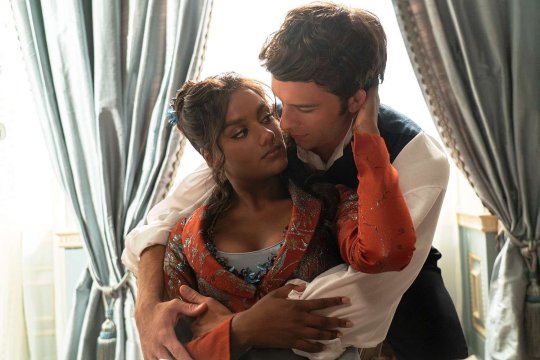
As June 2024 approaches, Netflix is set to offer an exciting lineup of new and returning titles for its subscribers in the United States. From highly anticipated Netflix Originals to classic movies and new seasons of beloved series, there's something for everyone to look forward to. Keep this page bookmarked, as it will be continuously updated with the latest additions. Image: Netflix Here's a comprehensive look at what's coming to Netflix in June 2024: Coming to Netflix June 2024 (Date TBD) - 100 Days to Indy (Season 2): The racing series returns, diving deeper into the high-speed world of IndyCar. - The Loot and the Lost Kingdoms (2024): A Nollywood documentary exploring the stolen treasures of the Benin Empire. - The Seven Deadly Sins: Four Knights of the Apocalypse (Season 1: Part 2): New episodes of the popular anime series. What’s Coming to Netflix on June 1st, 2024 - 1917 (2019): Sam Mendes’s Oscar-winning World War I drama about two soldiers on a crucial mission. - 30 for 30: Once Brothers: A compelling sports documentary. - A Million Ways to Die in the West (2014): A comedy Western starring Seth MacFarlane. - Ali (2001): Will Smith stars as the legendary boxer Muhammad Ali. - Baby Boy (2001): Tyrese Gibson leads this drama about a young man facing life's challenges. - Black Clover (Season 3): The latest season of the hit anime series. - Cold Copy (2024): A gripping film starring Bel Powley and Jacob Tremblay about a journalist and her mentee. - Detective Pikachu (2019): The live-action Pokémon adventure featuring Justice Smith and Ryan Reynolds. - Divergent Movie Collection: All three films in the series - Divergent, Insurgent, and Allegiant. - Dune (1984): David Lynch’s classic sci-fi adaptation. - Flushed Away (2006): A charming animated film from Aardman Studios. - Heartland (Season 16): New episodes of the heartwarming Canadian drama. - Home (2015): An animated movie from DreamWorks. - Janky Promoters (2009): Comedy starring Ice Cube and Mike Epps. - Kicking & Screaming (2005): A family comedy with Will Ferrell. - Land of the Lost (2006): An adventure comedy starring Will Ferrell. - Lumberjack The Monster (2023): A thriller about a lawyer seeking revenge. - National Security (2003): An action comedy with Martin Lawrence and Steve Zahn. - On the Basis of Sex (2018): The inspiring story of Ruth Bader Ginsburg. - Pilecki’s Report (2023): A WWII drama about Captain Witold Pilecki. - S.W.A.T. (2003): Action-packed thriller. - Simon (2023): A drama about a young man fleeing oppression in Venezuela. - Strawberry Shortcake’s Summer Vacation (2024): Animated fun for kids. - Tangerine (2015): A drama about two trans sex workers in LA. - The Breakfast Club (1985): The iconic John Hughes film. - The Conjuring Movie Collection: All three films in the horror series. - The Devil’s Own (1997): A thriller with Brad Pitt and Harrison Ford. - The Lego Movie (2014): The beloved animated comedy. - Two Can Play At That Game (2001): A romantic comedy with Vivica A. Fox and Morris Chestnut. What’s Coming to Netflix on June 3rd - 30 for 30: Lance (Season 1) - 30 for 30: The Good, The Bad, The Hungry - 30 for 30: The Life and Trials of Oscar Pistorius (Season 1) - 300: Rise of an Empire (2014): The epic action sequel. What’s Coming to Netflix on June 4th - Anti Hero (2024): A Japanese legal drama. - Ride on Time (New Episodes) - The Price of Nonna’s Inheritance (2024) Netflix Original: An Italian comedy. What’s Coming to Netflix on June 5th - How To Rob A Bank (2024) Netflix Original: A documentary about a master bank robber. - My Next Guest Needs No Introduction With David Letterman (Season 5) Netflix Original: Featuring Miley Cyrus and Charles Barkley. - Under Paris (2024) Netflix Original: A French horror thriller. What’s Coming to Netflix on June 6th - Baki Hanma VS Kengan Ashura (2024) Netflix Original: An epic anime crossover. - Basma (2024) Netflix Original: A Saudi drama. What’s Coming to Netflix on June 7th - Hierarchy (Season 1) Netflix Original: A new Korean drama series. - Hit Man (2024) Netflix Original: Richard Linklater’s romantic comedy starring Glenn Powell and Adria Arjona. - Perfect Match (Season 2) Netflix Original: Reality series. What’s Coming to Netflix on June 8th - Wonder (2017): A heartwarming drama starring Julia Roberts and Owen Wilson. What’s Coming to Netflix on June 11th - Keith Robinson: Different Strokes (2024) Netflix Original: Stand-up comedy special. - Tour De France: Unchained (Season 2) Netflix Original: Sports docu-series. What’s Coming to Netflix on June 12th - King of Collectibles: The Golden Touch (Season 2) Netflix Original - Mysteries of the Terracotta Warriors (2024) Netflix Original What’s Coming to Netflix on June 13th - Bridgerton (Season 3 – Part 2) Netflix Original - Doctor Climax (Season 1) Netflix Original - LEGO Friends (Season 2): Animated series for kids. - Remembering Gene Wilder (2024): A documentary about the beloved actor. What’s Coming to Netflix on June 14th - Abang Adik (2023): A Malaysian neo-noir drama. - Forged in Fire (Season 14) - Joko Anwar’s Nightmares and Daydreams (Season 1) Netflix Original What’s Coming to Netflix on June 15th - Cold Case Files (Season 3) - Miss Night and Day (Season 1) Netflix Original What’s Coming to Netflix on June 16th - Welcome to Marwen (2018): A drama starring Steve Carell. What’s Coming to Netflix on June 17th - 30 for 30: June 17th, 1984 - Carol (2015): An LGBT drama directed by Todd Haynes. What’s Coming to Netflix on June 18th - Agents of Mystery (Season 1) Netflix Original - Fifty Shades of Grey (2015) - Outstanding: A Comedy Revolution (2024) Netflix Original What’s Coming to Netflix on June 19th - Black Barbie: A Documentary (2024) Netflix Original - Dexter (Seasons 1-8): The complete crime series starring Michael C. Hall. - Inheritance (2024) Netflix Original - Kleks Academy (2024) Netflix Original - The Lego Batman Movie (2017): Animated adventure. What’s Coming to Netflix on June 20th - AMERICA’S SWEETHEARTS: Dallas Cowboys Cheerleaders (Season 1) Netflix Original - The Accidental Twins (2024) Netflix Original What’s Coming to Netflix on June 21st - Aftersun (2021) - Gangs of Galicia (Season 1) Netflix Original - The Victim’s Game (Season 2) Netflix Original - Trigger Warning (2024) Netflix Original What’s Coming to Netflix on June 22nd - Rising Impact (Season 1) Netflix Original What’s Coming to Netflix on June 24th - Little Angel (Volume 5): Kids animated series. What’s Coming to Netflix on June 25th - Kaulitz & Kaulitz (Season 1) Netflix Original - The Flash (2023): DC superhero movie. What’s Coming to Netflix on June 26th - Worst Roommate Ever (Season 2) Netflix Original What’s Coming to Netflix on June 27th - Drawing Closer (2024) Netflix Original - Supacell (Season 1) Netflix Original - That 90s Show (Part 2) Netflix Original - Unicorn Academy (Chapter 2) Netflix Original What’s Coming to Netflix on June 28th - A Family Affair (2024) Netflix Original - Hoarders (Season 14) - Kota Factory (Season 3) Netflix Original - Oloture: The Journey (Season 1) Netflix Original - **Owning Manhattan (Season 1) Netflix Original** - The Mole (Season 2) Netflix Original - The Whirlwind (Season 1) Netflix Original - Savage Beauty (Season 2) Netflix Original What’s Coming to Netflix on June 30th - Alone (Season 10) - NCIS (Seasons 16-17) - The Smurfs (Season 2) There's a wide range of content to look forward to on Netflix this June, from new seasons of hit series like "Bridgerton" and "Sweet Tooth" to classic films and exciting new releases. What are you most excited to watch? Let us know in the comments below. Read the full article
1 note
·
View note
Text
From Wichita to Dodge City, to the O.K. Corral in Tombstone, Wyatt Earp is taught that nothing matters more than family and the law. Joined by his brothers and Doc Holliday, Earp wages war on the dreaded Clanton and McLaury gangs.  Credits: TheMovieDb. Film Cast: Wyatt Earp: Kevin Costner Doc Holliday: Dennis Quaid Nicholas Earp: Gene Hackman James Earp: David Andrews Morgan Earp: Linden Ashby Ike Clanton: Jeff Fahey Josie Marcus: Joanna Going Sheriff Johnny Behan: Mark Harmon Virgil Earp: Michael Madsen Allie Earp: Catherine O’Hara Ed Masterson: Bill Pullman Big Nose Kate: Isabella Rossellini Bat Masterson: Tom Sizemore Bessie Earp: JoBeth Williams Mattie Blaylock: Mare Winningham Mr. Sutherland: James Gammon Frank McLaury: Rex Linn John Clum: Randle Mell Tom McLaury: Adam Baldwin Urilla Sutherland: Annabeth Gish Curly Bill Brocius: Lewis Smith Young Wyatt: Ian Bohen Virginia Earp: Betty Buckley Lou Earp: Alison Elliott Sherm McMasters: Todd Allen Francis O’Rourke: Mackenzie Astin Warren Earp: Jim Caviezel Mrs. Sutherland: Karen Grassle Frank Stillwell: John Dennis Johnston Sally: Téa Leoni Ed Ross: Martin Kove Bob Hatch: Jack Kehler Pete Spence: Kirk Fox Johnny Ringo: Norman Howell Marshal Fred White: Boots Southerland Indian Charlie: James ‘Scotty’ Augare Billy Clanton: Gabriel Folse Billy Claiborne: Kris Kamm Judge Spicer: John Lawlor John Shanssey: Michael McGrady Dr. Seger: Ben Zeller Stable Hand: Rockne Tarkington Mayor Wilson: David Doty Gyp Clements: Matt O’Toole Saddle Tramp: Brett Cullen Danny: Owen Roizman Gambler: Lawrence Kasdan McGee: Matt Beck Film Crew: Costume Design: Colleen Atwood Original Music Composer: James Newton Howard Producer: Kevin Costner Set Decoration: Cheryl Carasik Production Design: Ida Random Producer: Lawrence Kasdan Executive Producer: Charles Okun Director of Photography: Owen Roizman Producer: Jim Wilson Casting: Jennifer Shull Editor: Carol Littleton Art Direction: Gary Wissner Set Designer: Charlie Daboub Key Costumer: Barry Francis Delaney Set Designer: Barry Chusid Music Editor: Jim Weidman Supervising Sound Editor: Stu Bernstein Camera Operator: Ian Fox Executive Producer: Michael Grillo Hair Supervisor: Marlene D. Williams Assistant Art Director: Gershon Ginsburg Executive Producer: Dan Gordon Camera Operator: Bill Roe Foley: John Murray Script Supervisor: Anne Rapp Second Unit Director of Photography: Richard Bowen Set Designer: Tom Reta Dialogue Editor: Lewis Goldstein Executive Producer: Jon Slan Makeup Artist: Francisco X. Pérez Stunts: Gary McLarty Visual Effects Producer: Robert Stadd Chief Lighting Technician: Ian Kincaid Still Photographer: Ben Glass Dialogue Editor: James Matheny Costume Supervisor: Cha Blevins Foley: Dan O’Connell Property Master: William A. Petrotta Supervising Sound Editor: Robert Grieve Sound Re-Recording Mixer: Rick Kline Sound Re-Recording Mixer: Kevin O’Connell Construction Coordinator: Greg John Callas Boom Operator: Joel Shryack ADR Supervisor: Jessica Gallavan Hairstylist: Elle Elliott Dialogue Editor: Alison Fisher Key Makeup Artist: Gerald Quist Makeup Supervisor: Michael Mills ADR Editor: Joe Dorn Supervising Dialogue Editor: Bobby Mackston Key Costumer: Ruby K. Manis Key Grip: Tim Ryan Location Manager: Paul Hargrave Key Hair Stylist: Dorothy D. Fox Steadicam Operator: Rusty Geller ADR Editor: Stephen Janisz Rigging Gaffer: Kim Kono Dolly Grip: David L. Merrill Costume Supervisor: Le Dawson Key Costumer: James M. George Casting Associate: Phil Poulos Casting Associate: Elizabeth Shull Movie Reviews: GenerationofSwine: Tombstone was a different beast, and that sort of overshadows this, given that one tries to be more accurate and the other goes for entertainment. Take Wyatt Earp as a biopic and it is a superb and fair film. Compare it to Tombstone which was more of a Western and it’s lacking the flair. However, it ends abruptly, and it is miscast. Cosner (and i am a fan) doesn’t really make a good Earp. Dennis Quaid who I am also a fan of, doesn’t make a good Doc. This was 1994, in the 80s I might have a dif...

View On WordPress
#19th century#Arizona#deputy sheriff#doc holliday#gambling#gunslinger#historical figure#ok corral#sheriff#tombstone arizona#Top Rated Movies#wretch#wyatt earp
0 notes
Text
youtube
Congressional Districts by Martin Ginsburg The President of the United States, in order to foster actual representation of ALL Americans in Congress ought to propose legislation consistent with U.S. Const. art. I. § 4 cl 1 that the Congress use its constitutional powers to eliminate from consideration any factor other than place of residence through the implementation of the election of Representatives by districts designed as compactly as is possible. This goal to be attained by requiring that in addition to contiguity, compactness, and substantial equality of population that substantially symmetrical geographic mapping, as closely as may be provided for within the boundaries of each State; and, to the greatest extent possible representing a quadrangle comprising four 90o angles, of the districts therein established, requiring a 2/3 (TWO THIRDS) majority of both houses of the Congress to approve deviations from this proposed configuration or adjustment of district boundaries following a decennial census; a. As an alternative iteration, each State being required to identify a single portion of its boundaries forming as near a 90o angle as exists in its boundaries and beginning at that point, proceeding equidistantly from the axes formed until each district comprises the distribution of population as nearly equal as may be attained by the use of existing roadways as district boundaries. Such roadway boundaries, in descending order of precedence will be recommended as being: i. Primary Interstate Highways; ii. Primary United States Highways; iii. Secondary United States Highways; iv. Primary State Roads; v. Secondary State Roads; vi. Tertiary State Roads; vii. Primary County\Parish\Division Roadways; viii. Secondary County\Parish\Division Roadways; ix. Tertiary County\Parish\Division Roadways. Please subscribe to comment and share your thoughts, impressions, and insights on where this series could improve. Thank you for being here. via YouTube https://youtu.be/8TvyzBftvWA
0 notes
Text
Happy December! 🎁
This month we're embracing the season of sharing and gift-giving, so swipe and take a look at some treasures from our archives! #ArchivesGiftExchange #ArchivesHashtagParty
Scroll through to see photos of correspondence between Justice Ruth Bader Ginsburg and Professor Milton Konvitz from Cornell Law School, whom Ginsburg knew and respected. See also a few photos from our Triangle Shirtwaist Factory Fire collection, as well as a photo of a pair of shears from the factory. Additionally, see a portrait of Walter Reuther and James Carey, president and secretary-treasurer of the Congress of Industrial Organizations (CIO) at the time, as well as a message from Coretta Scott King Jr. used as promotional support material for Local 1199, said to have been Dr. Martin Luther King Jr.'s favorite union. Lastly, check out two photos of labor activists local to Ithaca, from our Tompkins Cortland Labor Coalition Photographs. And this just barely scratches the surface at what is contained in our archives.








#KheelCenter#ILGWU#Unions#Strikes#Contract#Labor#LaborHistory#LaborArchives#ArchivesHashtagParty#ArchivesGiftExchange#December
0 notes